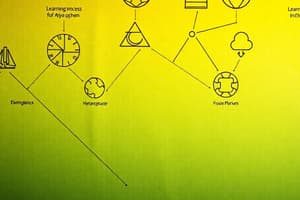Podcast
Questions and Answers
What is one potential benefit of understanding how we learn?
What is one potential benefit of understanding how we learn?
- It can enhance the effectiveness of your own learning. (correct)
- It can improve your general health.
- It can decrease motivation to learn.
- It can lead to negative results in personal learning.
Which statement best reflects the importance of learning strategies?
Which statement best reflects the importance of learning strategies?
- Familiarity with learning methods positively influences learning outcomes. (correct)
- Learning strategies have no impact on outcomes.
- Most learning occurs without the need for strategies.
- Effective learning strategies can hinder personal growth.
How can knowledge of learning processes influence educational success?
How can knowledge of learning processes influence educational success?
- It can provide insight into avoiding all forms of learning.
- It has no bearing on educational success.
- It can offer positive strategies that enhance learning outcomes. (correct)
- It can create an environment that is unfavorable for learning.
What is implied about the relationship between learning knowledge and personal development?
What is implied about the relationship between learning knowledge and personal development?
What aspect of learning does gaining insight into learning processes primarily affect?
What aspect of learning does gaining insight into learning processes primarily affect?
Match the prioritization technique with its description:
Match the prioritization technique with its description:
Match the prioritization technique with its main focus:
Match the prioritization technique with its main focus:
Match the prioritization technique with its desired outcome:
Match the prioritization technique with its desired outcome:
Match the technique with its benefit:
Match the technique with its benefit:
Match the prioritization technique with the concept it embodies:
Match the prioritization technique with the concept it embodies:
Flashcards are hidden until you start studying
Study Notes
Understanding Learning and its Benefits
- Potential Benefit: Understanding how we learn can help us become more effective learners. This involves identifying our strengths and weaknesses, adapting learning strategies, and maximizing our potential.
Learning Strategies: A Key to Success
- Importance: Learning strategies are crucial for achieving educational success. They provide a framework for effective learning, enabling students to acquire, retain, and apply knowledge more efficiently.
Educational Success: Leveraging Learning Processes
- Impact: Knowledge of learning processes can significantly influence educational success. By understanding how we learn, individuals can design, implement, and evaluate learning experiences that align with their unique cognitive abilities and learning styles.
Learning Knowledge and Personal Development: A Intertwined Relationship
- Implication: Understanding how we learn is not just about academics; it's deeply linked to personal development. It empowers individuals to take control of their learning, fostering self-awareness, critical thinking, and a lifelong passion for acquiring knowledge.
Insight into Learning Processes: Enhancing Metacognition
- Focus: Gaining insight into learning processes primarily affects our metacognition. It allows us to become more aware of our learning processes, monitor our progress, and make adjustments to our learning strategies as needed.
Eisenhower Matrix
- Divides tasks into four categories based on urgency and importance.
- Urgent and Important: Do these tasks first.
- Important but Not Urgent: Schedule these tasks for later.
- Urgent but Not Important: Delegate or minimize these tasks.
- Not Urgent and Not Important: Eliminate these tasks.
ABC Method
- Categorizes tasks into three levels of priority.
- A Tasks: High priority, must-do tasks.
- B Tasks: Medium priority, should-do tasks.
- C Tasks: Low priority, could-do tasks.
- Focus on completing A tasks before moving to B and C.
Pareto Principle (80/20 Rule)
- States that 80% of results come from 20% of efforts.
- Identify the 20% of tasks that yield the most significant outcomes and prioritize them.
MoSCoW Method
- Stands for "Must have," "Should have," "Could have," and "Would like to have."
- Prioritizes features or tasks based on urgency and importance.
Time Blocking
- Schedules specific blocks of time for each task.
- Helps set boundaries and reduce distractions while prioritizing essential tasks.
SMART Goals
- Ensures tasks are:
- Specific
- Measurable
- Achievable
- Relevant
- Time-bound
- Provides clarity on priorities and what needs to be accomplished within set deadlines.
Daily and Weekly Reviews
- Allocate time at the start or end of the day/week to assess and plan tasks.
- Regularly reassess priorities to adapt to new challenges and deadlines.
Limit Distractions
- Identify and minimize distractions that can derail focus on high-priority tasks.
- Use techniques like the Pomodoro technique to maintain concentration.
Studying That Suits You
Use AI to generate personalized quizzes and flashcards to suit your learning preferences.



